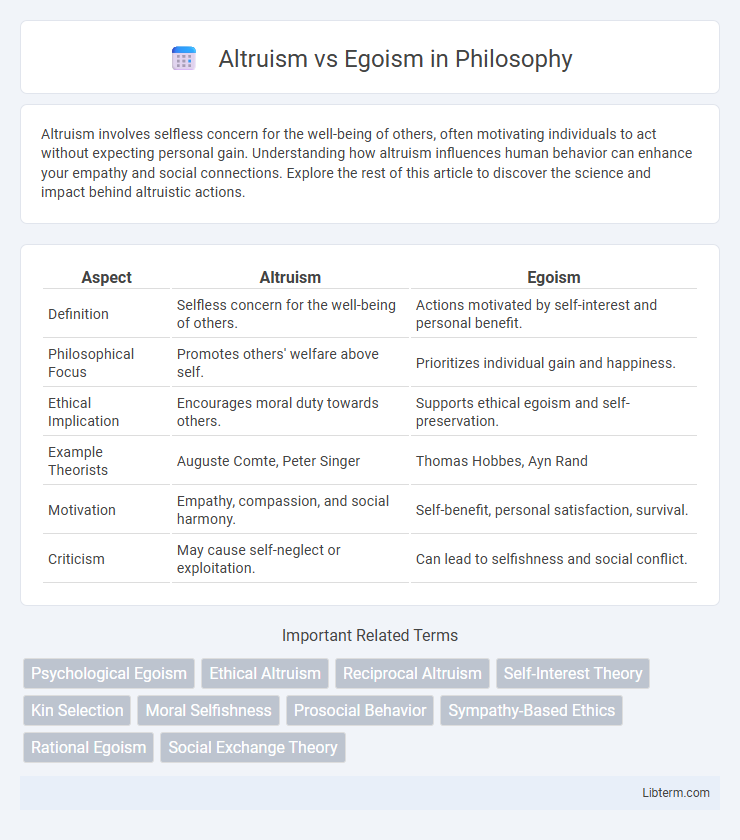Altruism involves selfless concern for the well-being of others, often motivating individuals to act without expecting personal gain. Understanding how altruism influences human behavior can enhance your empathy and social connections. Explore the rest of this article to discover the science and impact behind altruistic actions.
Table of Comparison
| Aspect | Altruism | Egoism |
|---|---|---|
| Definition | Selfless concern for the well-being of others. | Actions motivated by self-interest and personal benefit. |
| Philosophical Focus | Promotes others' welfare above self. | Prioritizes individual gain and happiness. |
| Ethical Implication | Encourages moral duty towards others. | Supports ethical egoism and self-preservation. |
| Example Theorists | Auguste Comte, Peter Singer | Thomas Hobbes, Ayn Rand |
| Motivation | Empathy, compassion, and social harmony. | Self-benefit, personal satisfaction, survival. |
| Criticism | May cause self-neglect or exploitation. | Can lead to selfishness and social conflict. |
Understanding Altruism: The Selfless Act
Altruism represents a selfless concern for the well-being of others, often manifesting in actions that benefit others without expectation of personal gain. Psychological studies reveal altruistic behavior is linked to empathy and moral principles, encouraging prosocial behavior that strengthens social bonds. Neuroscientific research supports that altruistic acts activate brain regions associated with reward and social bonding, distinguishing them from egoistic actions driven by self-interest.
Defining Egoism: Self-Interest as a Driver
Egoism defines self-interest as the fundamental motivator behind human actions, asserting that individuals prioritize their own benefits and well-being above all else. Psychological egoism suggests all decisions are inherently driven by personal gain, while ethical egoism promotes actions that maximize one's own advantage as morally right. This framework contrasts with altruistic principles by emphasizing self-benefit as the core of ethical consideration and behavior.
Historical Perspectives on Altruism and Egoism
Historical perspectives on altruism and egoism trace back to ancient philosophers like Aristotle, who emphasized eudaimonia--a balance between self-interest and concern for others--while Thomas Hobbes viewed human nature as fundamentally self-interested, promoting egoism. In the 19th century, Auguste Comte coined "altruism" to describe selfless concern for others, contrasting with egoism theories by thinkers such as Friedrich Nietzsche, who argued that self-interest underpins morality. These philosophical foundations influenced modern psychology and ethics debates, shaping contemporary understandings of altruistic and egoistic motivations.
Psychological Theories Behind Giving and Taking
Psychological theories behind altruism vs egoism explore motivations driving giving and taking behaviors, with altruism emphasizing selfless concern for others' well-being and egoism highlighting self-interest and personal gain. The empathy-altruism hypothesis suggests empathetic feelings prompt genuine altruistic acts, while social exchange theory frames helping as strategic actions aimed at maximizing personal rewards or minimizing costs. Research integrates concepts from evolutionary psychology and cognitive neuroscience, revealing complex neural mechanisms influencing prosocial and self-serving behaviors.
Altruism in Everyday Life: Examples and Impact
Altruism in everyday life manifests through acts such as volunteering, donating to charity, and helping strangers without expecting rewards, significantly enhancing social cohesion and individual well-being. Psychological studies link altruistic behavior to increased happiness and reduced stress, demonstrating its positive impact on mental health. Communities with high levels of altruism experience stronger trust and cooperation, fostering environments where collective problem-solving and mutual support thrive.
Egoism in Modern Society: Motivations and Consequences
Egoism in modern society is driven by self-interest, where individuals prioritize personal gain, success, and well-being over collective welfare. This motivation shapes behaviors in competitive environments, influencing economic decisions, social interactions, and political policies. Consequences of egoism include increased innovation and efficiency, but also social fragmentation, reduced cooperation, and ethical challenges.
Moral Dilemmas: Choosing Between Self and Others
Moral dilemmas involving altruism and egoism often highlight the conflict between prioritizing self-interest and the welfare of others. Altruistic decisions emphasize acts that benefit others, sometimes at personal cost, reflecting ethical frameworks like utilitarianism and virtue ethics. In contrast, egoism centers on actions motivated by self-benefit, raising questions about the moral justification of prioritizing individual needs over collective well-being.
Evolutionary Roots: Are We Wired for Altruism or Egoism?
Evolutionary biology suggests humans possess innate tendencies for both altruism and egoism, shaped by natural selection to maximize survival and reproductive success. Kin selection theory reveals altruistic behaviors evolve because they increase the survival of genetically related individuals, promoting the preservation of shared genes. Conversely, egoistic actions emerge from individual fitness advantages, highlighting a complex interplay where cooperative and self-interested behaviors coexist within human evolutionary history.
Altruism vs Egoism in Relationships and Community
Altruism in relationships fosters trust and emotional support by prioritizing others' well-being, enhancing community cohesion through acts of kindness and cooperation. Egoism often leads to self-centered behaviors that can undermine relationship stability and weaken social bonds due to a focus on personal gain. Balancing altruistic and egoistic tendencies is essential for nurturing healthy interpersonal connections and building resilient communities.
Striking a Balance: Integrating Altruism and Egoism
Striking a balance between altruism and egoism involves recognizing the benefits of self-interest while valuing the welfare of others, fostering cooperative relationships and personal well-being. Integrating both ethical frameworks can enhance decision-making by promoting empathy alongside individual goals, leading to sustainable social harmony. Research in social psychology highlights that balanced altruistic and egoistic motivations contribute to increased trust, reciprocity, and long-term success in diverse communities.
Altruism Infographic

 libterm.com
libterm.com